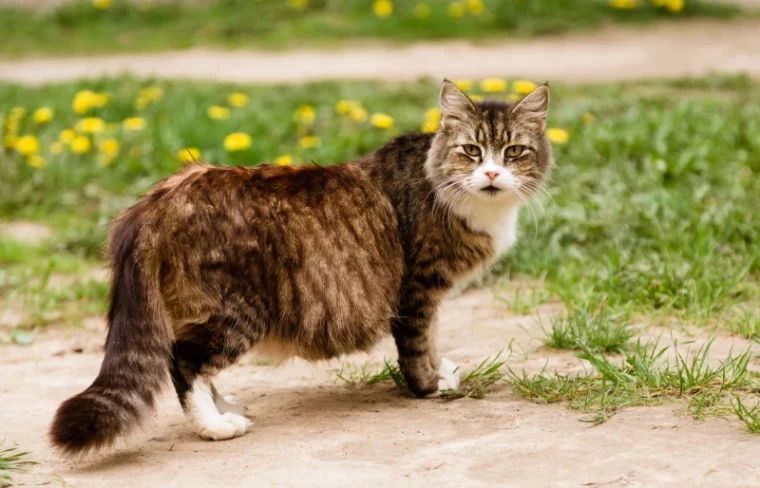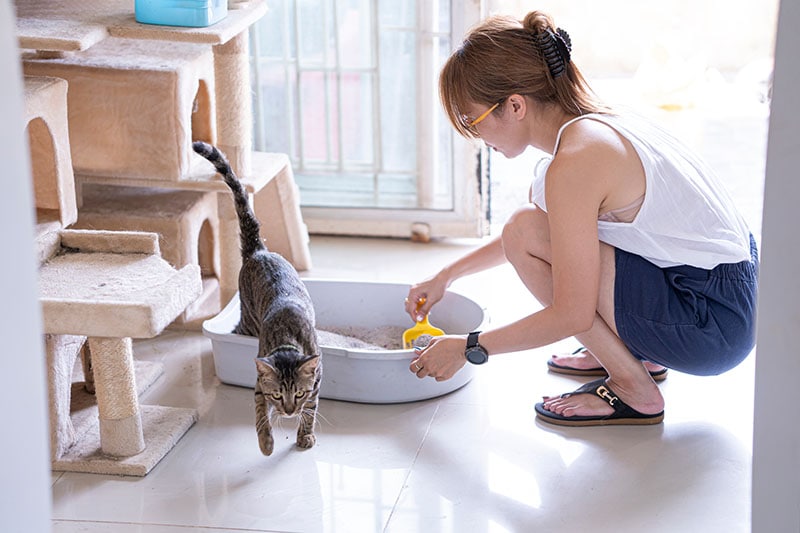
As much as we hate to admit it, cats can be snobs.
Most have standoffish personalities, and it’s easy to get the impression that your pet doesn’t really need you. But are cats truly independent? Domestic cats may not be as cuddly as dogs, but they are not as independent as many perceive them to be.
Read on to learn more about your cat and whether they can form genuine bonds with people and other pets. We will also share some tips to ensure you meet your furry friend’s social needs.
An Overview of a Cat’s Independence
Felines are independent creatures or are at least more independent than their canine counterparts. They make excellent furry companions for busy households or people who prefer not to have clingy or overly needy pets.
Although they have been domesticated for thousands of years, they have aloof and standoffish personalities because of their strong hunting instincts.
Cats stalk, hide and pounce on prey. This hunting tactic works best when alone; any disruption can lead to a cat losing their meal. As such, felines are solitary creatures, and their survival doesn’t depend on the efforts of other team players.
Domestic cats don’t need to hunt and depend on their owners for food, water, companionship, and a clean living environment. Even with some degree of dependence and attachment to humans, they remain inclined to maintain some sense of independence.

Why Are Cats So Independent?
Like all other animals, food is the most basic need that ensures survival. Your cat doesn’t rely solely on you for their existence and can still get by on their own. Your furry friend is among the world’s most fierce predators, and they know this. Consequently, they also don’t view you as their primary source of safety or security.
Cats are so independent because they know they can survive without humans.
Still, they can form genuine bonds with their owners and other pets.
Depending on breed and personality, cats can form different attachments with people and other pets. These include open relationships, where they often seem aloof, remote associations, casual attachments, co-dependent relationships, and actual friendships.
Cats can be both sociable and independent. Because they don’t rely on humans for reassurance of their survival, the type of attachments they form often depends on the efforts their owners put into the relationship.
Are All Cats Highly Independent?
It’s in a cat’s DNA to be largely independent and solitary. Still, some breeds defy the norm and actually have big personalities. They show lower levels of passive behavior when their owners are around and show signs of distress when left alone.
Some of the feline breeds known to be affectionate, social, and borderline needy include the Russian Blue, British Shorthair, Maine Coon, and Scottish Fold, just to mention a few.
Although their degree of attachment also depends on the emotional investment their owners make, they are not your typical low-maintenance cats. They thrive when offered more attention and affection.

Are Cats Capable of Forming Social Bonds?
According to history, cats domesticated themselves. They roamed close to villages where there were ample supplies of rodents. It was not long before they were invited indoors to keep food stocks safe from vermin. Based on this, they typically form bonds that work for them.
Depending on your time and emotional investment in your relationship with your cat, they can bond with you. You can tell your furry friend cherishes the bond between you if they seek your attention and affection. They may do this by licking your face, rubbing against your legs, purring in your presence, and following you around.
If you’re lucky and they perceive you as an essential source of comfort and security, they could even bring you gifts like toys, or a lizard caught outside.
Devoid of competition for food, cats can also form bonds with other pets. When they do, they engage in mutual grooming, play, and sleep together and even share treats, toys, and other vital resources.
Top 4 Tips on How to Strengthen Your Bond With Your Cat
Cats are semi-social, meaning they have the potential to be independent or to form genuine attachments with people and other pets. Often, your efforts will dictate whether your furry friend views you as its safe hub.
Learning your pet’s personality is the most crucial step to ensuring successful bonding. Each cat is an individual with unique preferences, especially when it comes to bonding with humans. While some enjoy petting and following their owners everywhere, others are content sitting next to you with little or no physical interaction.
Here are a few tips that can sharpen your cat’s social skills and increase their odds of bonding with you.
1. Meet Their Basic Needs
It’s a no-brainer that a cat will only bond with you if your relationship makes sense. Providing a safe space and essential resources like food, water, scratching posts, and a clean toileting area is just one way to make an otherwise independent cat dependent on you.
Apart from the basics, your furry friend will appreciate the extra efforts you make to give him a comfortable life. Grooming, bonding, and play sessions provide excellent opportunities to work on your relationship.
Also, providing quality healthcare can help reduce feline stress and help ensure your pet’s proper physical, social, and emotional development.

2. Create a Bonding Time Routine
Among the key aspects determining a cat’s social demeanor are genetics and early experiences. Irrespective of your furry friend’s breed, he can learn to be more social if you don’t leave him to his own devices, especially during kittenhood.
Interact with them frequently and invite them for play sessions. When they seem bored, use catnip toys to engage them and generally ensure they are accustomed to being handled by people. The trick is to maintain some consistency in their social life.
3. Know When to Back Off
If you want to build a strong rapport with your furry friend, you must know when to take a step back. As semi-social creatures, cats also love moments of solitude when they can sleep, relax, recharge, or study their environment. Forcing interactions when your kitty wants time alone can hinder your bonding efforts.
The safest way to go around this is to encourage your pet to come to you. Offer an outstretched hand and check their response. You could also entice them to come to you using toys or treats. If they look the other way and pretend to be dozing off, walk away and try initiating a bonding session later.

4. Give Your Cat Their Own Space
It’s impossible to bond with a cat if you don’t give them their own space!
If you bend to the urge to pick up your furry friend and snuggle them each time you see them, they will take flight the next time they spot you. This can be counterproductive to your bonding attempts.
On the other hand, giving your pet their own space makes them feel more secure in your home. A cat cave or a covered and enclosed bed can do the trick. It will provide the perfect space for your pet to spend downtime alone and come out when they want human interaction.
Remember to keep the cat cave a no-human zone and respect moments when your pet wants solitude. This will make social interactions special and more pleasurable. Your furry buddy will also develop a positive association with your presence in a room and look forward to the time you spend together.
5. Make Each Bonding Session Count
When it’s time to play and bond with your cat, ensure each minute counts.
Use toys and games that allow them to mimic the natural hunting sequence during play sessions. They will have more fun hiding, stalking, and pouncing on “prey.” Also, provide areas that encourage independent play. The idea is to offer a living space that continually keeps your furry friend active and mentally stimulated.
During bonding sessions, make an effort to “speak cat.” Learn your pet’s body language to know when they want attention, affection, or to hang around close to you.
Final Thoughts
Cats, irrespective of breed, have a regal demeanor. They carry themselves with composure and dignity even when you return home after long work hours. These mysterious creatures rarely display the degree of neediness commonly showcased by other pets like dogs.
Still, cats are sociable. They just have a unique way of showing it and typically only display subtle signs of affection.
If your furry friend touches you with their nose, sits next to you when you’re working, or slowly blinks their eyes when you reach out to pet them, that’s enough evidence that they like you. Even with a seemingly aloof nature, they depend on you to do more than serve a meal and scoop their poop.
Featured Image Credit: Inha Makeyeva, Shutterstock







